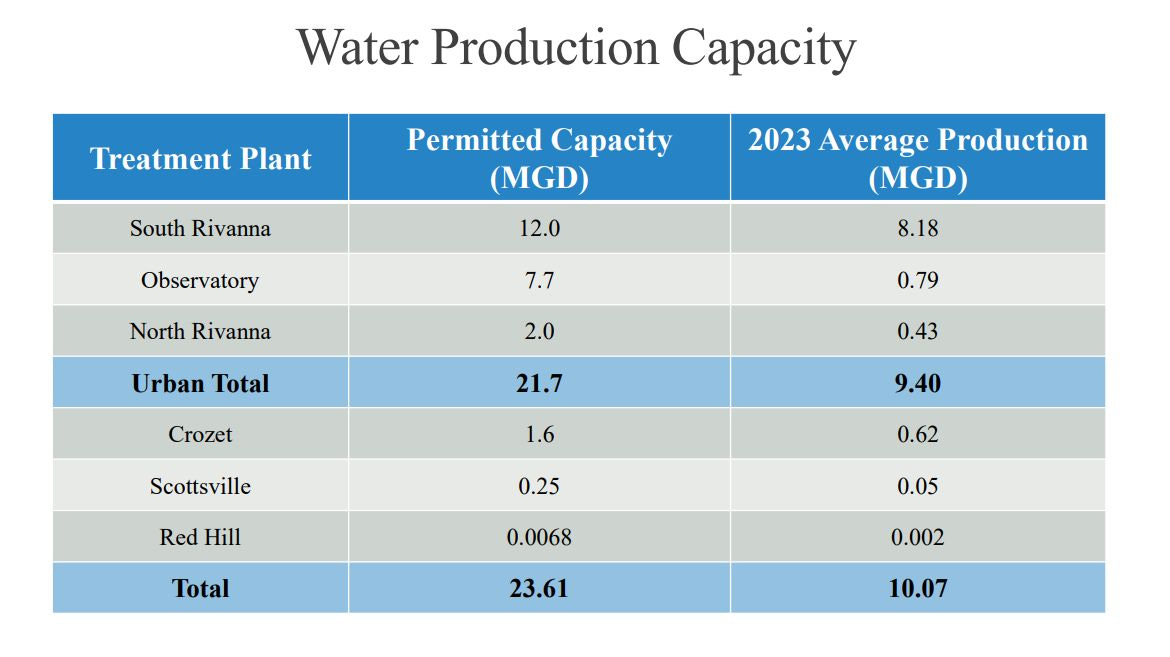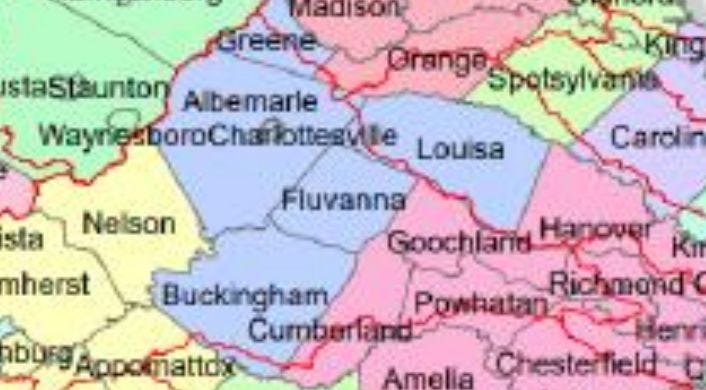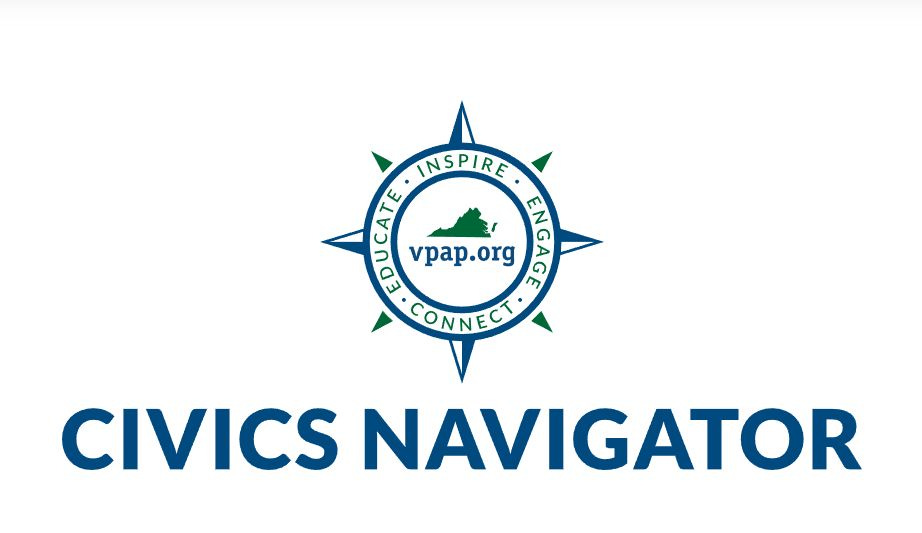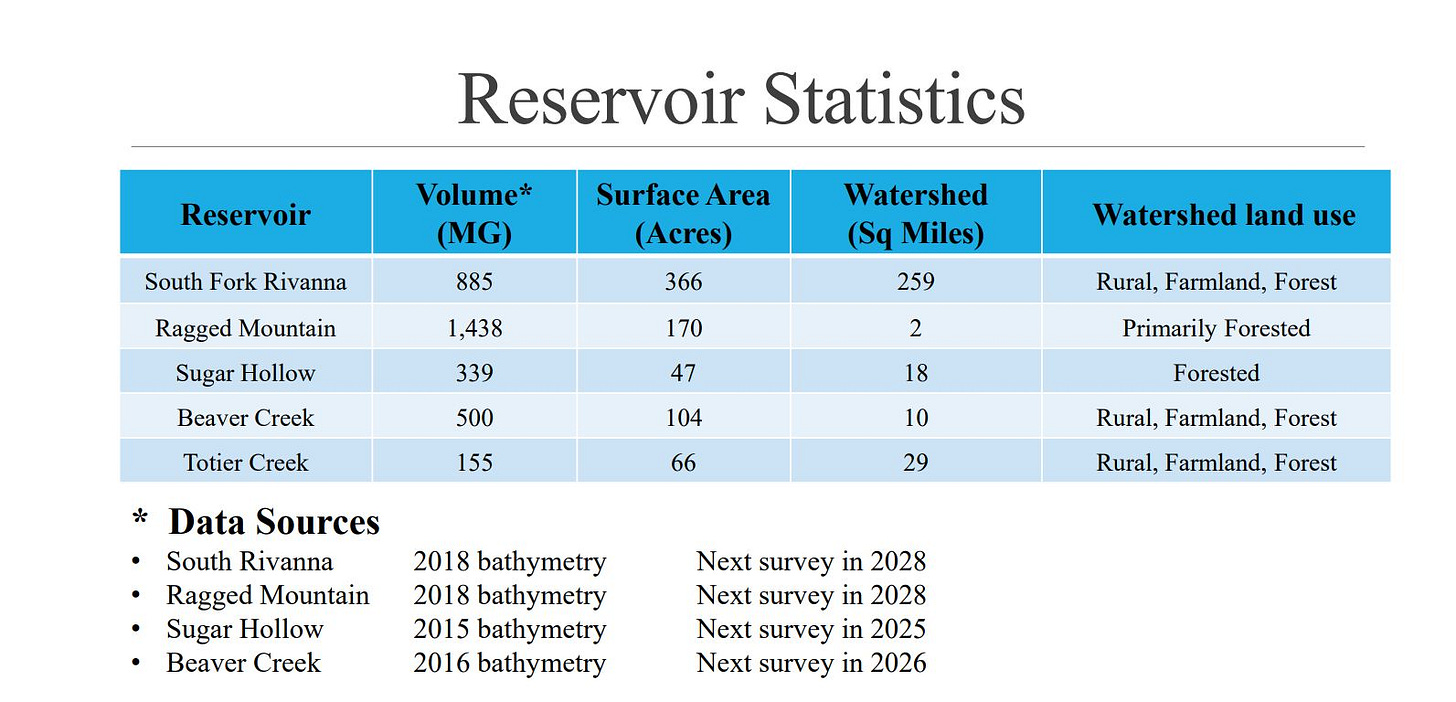September 4, 2024: Crozet may run out of water to support population growth after 2045; Water supply planning in Virginia to become more regional
Plus: Stroman has retired as Charlottesville’s City Attorney after unspecified charges were dismissed
For the second time this year, there is an edition of Charlottesville Community Engagement published from a city beginning with “Ch” that is not the usual locality of origin. This 726th edition is also the second to be sent out from the Central time zone, a fact that has absolutely nothing to do with any of the stories contained after this opening paragraph. I’m Sean Tubbs, and hello from Chicago!
In today’s installment:
Charlottesville will look for a new attorney with the retirement of Jacob Stroman
A nonprofit watchdog of Virginia government launches a new way for teachers to help people learn about civics
The Rivanna Water and Sewer Authority gets an operations update and learns there may be a need to plan for more water for Crozet
The Albemarle Planning Commission gets updates on the Comprehensive Plan and incentives to build affordable housing the county
First-shout: Five Things ReLeaf Cville Has Done This Year
In today’s first subscriber-supported shout-out: ReLeaf Cville seeks to help restore the amount of the city that’s covered by trees. This year they’ve done five things they want people to know about:
The Virginia Department of Forestry awarded a $190K grant to preserve mature trees in neighborhoods with low tree cover, targeting Fifeville
Another grant helped with the planting of almost 130 trees in the Rose Hill neighborhood
This summer will be the third in a row they’ll partner with the Rivanna Conservation Alliance to train young people to help with outreach efforts to plant trees in the Woolen Mills neighborhood
They partnered with the Van Yahres Tree Company to provide volunteer work on Arbor Day to check in with recently planted trees in the 10th and Page neighborhood
They appeared on VPM in late June to discuss their work to date (read the report)
Charlottesville will need to look for another city attorney, again
Charlottesville City Attorney Jacob Stroman is retiring from local government after serving on the job for less than a year. Stroman was placed on administrative leave in April for an undisclosed personnel matter, but has decided not to come back to work.
In a press statement, Mayor Juandiego Wade said the city appreciates the work Stroman did during his short tenure, work which included presiding over the completion of the Cville Plans Together initiative and the adoption of a new zoning code.
“He has been exonerated from the claims that prompted his administrative leave,” Wade said, without going into details of what happened.
Stroman had been the choice of former interim City Manager Michael C. Rogers.
“The array of legal issues on which I was privileged to work were challenging, important to the continued prosperity of the City and, in many cases, cutting edge,” Stroman said, adding he was grateful for the chance to represent Charlottesville.
The firm Sands Anderson will continue to serve the function of city attorney on an interim basis until a permanent replacement is selected. They performed that same role after Lisa Robertson resigned abruptly at the end of December 2022.
Virginia Public Access Project launches “Civics Navigator”
A nonprofit group that seeks to increase community knowledge about how government works in Virginia has launched a new program intended to help teachers build lesson plans.
“Designed for all educators, Civics Navigator provides essential tools and resources for fostering civic engagement in the classroom,” said Chris Piper, executive director of the Virginia Public Access Project.
The Virginia Public Access Project, or VPAP, was created in 1997 to track all manner of items in state government including campaign finance reports. The new Civics Navigator is intended to help encourage young people to know more how public affairs work and to teach data literacy.
“As one of only four states with off-year elections, Virginia students can benefit from year-round civic engagement in local and state governance,” the website reads.
One of the offerings on the Civics Navigator is the “Civics Brief,” a frequent email with links to VPAP’s data visualizations with key dates and context. There’s also “Civics Current” with longer reads intended for those who teach local government. These will be more frequent when there’s more activity such as when the General Assembly is in session.
RWSA may need more water for Crozet, plan jointly with Fluvanna, Louisa and Greene
Growth in the urbanized portions of Albemarle County and Charlottesville depends on the amount of treated drinking water that can be provided and the amount of wastewater that can be processed. That planning could become more complicated if the Commonwealth of Virginia follows through with requiring more regional cooperation within watersheds.
The Rivanna Water and Sewer Authority is responsible for both services and the latter requires the maintenance of several waterways and pipelines. The Board of Directors got a series of updates at their meeting on August 25, 2024.
“As we all know, we have a series of reservoirs that we manage for our water sources and then we have a river intake on the North Rivanna River on the north side of the county,” said David Tungate, RWSA’s director of operations.
The Ragged Mountain Reservoir, the South Fork Rivanna Reservoir, and the Sugar Hollow Reservoir are all on land owned by the City of Charlottesville and water from there goes to both city and Albemarle customers. Beaver Creek Reservoir provides water for Crozet and Totier Creek provides water for the Town of Scottsville.
A reservoir is a biological ecosystem and tests are conducted throughout the year to assess the environmental health of each waterway.
“Our goal is to collect data to better understand the biological processes in our reservoirs to make better water treatment plant decisions,” Tungate said. “How we run the plants, how we treat the water.”
Albemarle Supervisor Ann Mallek is the county’s representative on the RWSA. She said there has been an issue with landowners on reservoirs who completely clear the landscape.
“Which I know is not legal and I think it takes someone stronger than county parks,” Mallek said.
“It’s a zoning violation of your water protection ordinance because there’s a setback from all the public reservoirs of some width,” said Bill Mawyer, the RWSA’s executive director. “And that’s part of our reservoir management program is when we ride around in the boat, we’re looking to see who is clearing down to the water’s edge but then we notify the county because it’s a county ordinance.”
Vegetated buffers can reduce pollutants and sediment by making it harder for them to flow into a waterway. Tungate said the RWSA does tell Dominion not to apply herbicide on easements they have within 50 feet of the reservoir.
The RWSA Board also got a snapshot on operations at the six treatment plants which take water from the various sources. In addition to the five urban reservoirs, there’s a much smaller treatment plant that takes in groundwater for an area in Red Hill in southern Albemarle. Tungate said this serves a dozen homes and a public school.

The South Rivanna Water Treatment Facility is staffed 24 hours a day, seven days a week because it is considered a Class 1 facility under Virginia regulations.
“If you’re drinking water in the urban system it’s because someone is working at South Rivanna right now,” Tungate said. “Easter, Christmas, all holidays, someone is working there.”
Crozet is a Class 2 facility and Scottsville is a Class 3 facility given their lower volumes.
“And then the Red Hill facility because it is groundwater and doesn’t have much treatment, the rules require someone to check on it once a day,” Tungate said.
Tungate said the Red Hill treatment plant is still monitored constantly using automated systems.
RWSA needs a new water permit
The ability to draw water and treat it for customers comes through the Virginia Department of Environmental Quality as well as the U.S. Army Corps of Engineers. One of the items these regulators look at is how much water ends up being added back to the watershed in streams.
The RWSA’s current permit was approved by the DEQ in 2011 and expired in February 2023.
“And you’re required to submit a pre application prior to that date and we did in 2021,” said Jennifer Whitaker, the RWSA’s chief engineer. “Due to staffing shortages at DEQ, they have still not completely reviewed and turned around our permit.”
Whitaker said DEQ issued a continuance in 2022 which means the RWSA is in compliance. However, the DEQ is expecting a new application from the agency this fall. This procedural requirement comes after the RWSA has built a new dam at Ragged Mountain Reservoir to expand the pool, but before work begins to build a nine mile pipeline to connect it with the South Fork Rivanna Reservoir.
“Generally if you’re just renewing, I don’t believe it’s such an onerous process, but because we are still constructing as well as withdrawing water, we still have components of the Community Water Supply Plan that we are constructing, there is more scrutiny to the permit process,” Whitaker said.
Crozet may run out of water to support growth by 2045
That does not include the Crozet water system, which comes from Beaver Creek.
“The reservoir, Beaver Creek Dam is what we call it, it’s actually called the Garnett Dam I believe,” Whitaker said. “It was constructed in 1963. It’s been the water supply for Crozet since then.”
Whitaker said new dam safety regulations that went into effect in 2011 and that upgraded Beaver Creek’s dam to a “high hazard dam” which led to an analysis of the Crozet water system.
“So we’ve been having conversations with the DEQ staff since 2017, so thinking we fully understood all of the requirements, we submitted our permit in 2022 and earlier this year we received draft permit language,” Whitaker said.
Whitaker said there were some comments that the RWSA did not expect, such as how the DEQ will only allow this permit to consider the first 15 years of demand rather than the 50-year planning horizon the agency usually requests. She explained what one practical effect might be.
“The state is most likely going to require more water going downstream than we’ve understood in 2017 through 2022 and what that means is that we are likely going to need additional water supply beyond 2045,” Whitaker said.
Whitaker said this alters the RWSA’s perception that there was enough water supply to support Crozet through 2070, but she said the process is still ongoing.
Regional planning in the TJPDC area?
Virginia’s current mechanism for approving municipal water supply systems dates back to the drought of 2002 that resulted in DEQ having the authority to require communities to have a plan.
“Localities were required to submit a water supply plan and there were 48 submitted by 2008, ten of which were what they called local plans and 38 were regional plans,” Mawyer said.
In recent years, the process has been changed through action of the General Assembly. Mawyer said the intent is to encourage more collaboration across jurisdictions.
“Albemarle has been grouped with Greene, Louisa, Fluvanna, and Buckingham counties as our new water supply planning area,” Mawyer said.

These new boundaries will come up for public comment later this month.
The new rules introduce an interesting layer of potential governmental interaction at a time when the James River Water Authority has broken ground on a new waterline to serve Zion Crossroads and as Greene County struggles to identify ways to pay for a reservoir permitted by the DEQ.
Mawyer said he is making efforts to reach out to all of the various players.
Another factor for the future across the nation is a changing set of rules that could lead to consolidation. The United States Environmental Protection Agency now has authority to force smaller water treatment systems to be restructured to meet enhanced water quality requirements.
Mallek said she was concerned that well-established entities like RWSA will have to pay for some of the soft costs of regional cooperation outside of existing partnership. She is also the co-chair of a local government council that advises the EPA.
“There’s been a huge amount of pushback at the EPA, the local government planning, when this restructuring committee began because yes on one hand there are communities who lack expertise,” Mallek said. “They have 3,000 customers and don’t have a chance at any cost to do this, but they’re also fearful because the feds use the term consolidation as if they’re going to be forced to be bought up by the worse case scenario, a private company who will take them to the cleaners big time.”
Mallek asked the RWSA Board to consider directing Mawyer to notify Greene County that there will be no capacity to help them out until 2034 when the Community Water Supply Plan.
City Manager Sam Sanders asked for clarity that there was no mandate yet for regions to build together, but only to plan together. Mawyer said that was the case and there has so far only been an informal inquiry from Greene.
“Under the sentiment expressed, we should try to keep this as official as we possibly can and that we would be responding to a request and without a request I think they can look at our minutes and understand sentiments being expressed about what the concerns might be,” Sanders said.
Stay tuned for more information as it develops.
Second-shout out: Piedmont Master Gardeners marks Hunger Action Month
A successful season in the garden often produces more food than a family can consume or preserve. As the nation observes Hunger Action Month, the Piedmont Master Gardeners are encouraging food growers to share that extra bounty with food distribution hubs that help people in the community meet their nutritional needs.
PMG’s Share Your Harvest program offers an online listing of local food banks and food pantries that accept donations of homegrown fruits and vegetables. The program also provides an interactive map to help locate donation sites, as well as details about when and where fresh produce can be delivered.
Among the organizations is the Blue Ridge Area Food Bank. It distributes food to hundreds of pantries and other partner agencies in a 25-county region that includes Charlottesville and Albemarle County.
Public to see latest Albemarle Comprehensive Plan documents in advance of October meeting
Staff in Albemarle’s Department of Community Development continue to work on a reformatted version of the county’s Comprehensive Plan. This summer, both the Planning Commission and the Board of Supervisors were told of changes to the way the state-mandated review will be completed.
The Planning Commission will get a portion of the document at its meeting on October 8.
“We’ve sort of made the decision to not provide the whole entire plan,” said Albemarle Planning Director Michael Barnes toward the end of the August 27 Planning Commission meeting. “We sort of talked about how we’re going to bring it in more manageable chunks.”
The first chunk will be the growth management policy which Barnes called the most fundamental of Albemarle’s principles. Other chunks will include rural land use and development area land use. Commissioners will have a chance to review the various goal statements.
Barnes said the new goal is to complete the Comprehensive Plan by this time next year. Later this fall, the Planning Commission will be presented with details of a solar ordinance.
Recent AC44 stories:
Planning Commissioners briefed on “refinement” of AC44 process, July 17, 2024
Public engagement to happen before Albemarle staff release AC44 draft, August 7, 2024
Commissioner Julian Bivins asked when the Planning Commission might be able to review the concept of agricultural-forestal districts and whether they are having the effect of preserving farmland.
“The whole idea of what’s the nexus between the districts and the funding mechanism and what the cost of that is under today’s policy,” Bivins said.
The landowners of qualified properties that are in agricultural-forestal districts receive a reduced property tax burden if they agree to not develop their land for the foreseeable futures.
“What I’m trying to get at is that there’s this whole idea that there’s a revenue loss, a leakage, because of that program and to try to have some sense on whether what the cost-benefit of that leakage given the county is constrained in the way it can raise revenues,” Bivins said.
The recent sale of the for-profit Cavalier Crossings to an investment fund also came up at the end of the meeting.
Rio District Commissioner Nathan Moore said the county should begin to develop its own housing projects.
“And there’s different ways to do it and different ways to go about it, but I think if we can think about how we can put county resources toward public goods which includes to me like our UVA Health wage workers being able to afford to live here, then that’s progress,” Moore said.
Albemarle County created an “Affordable Housing Investment Fund” as part of the budget for fiscal year 2019. According to the FY 25 budget, the fund is intended to “is intended to “support housing initiatives that are one-time costs and will support the County’s strategic and housing goals.”
Unlike the various community advisory committees, the Planning Commission has not had an update on the Housing Albemarle plan intended to incentivize the creation of more below-market units. Albemarle Community Development Director Jodie Filardo gave one at the August 27 meeting.
“The Board of Supervisors has actually adopted a rental incentive program [which] does exchange 20 percent of the units at 60 percent of the [area median income] for a 15 percent tax increment reduction over a ten year period over the entire project, not just the rental units,” Filardo said. “That is one program that is distinct and specific.”
Filardo said the county is open to other conversations about providing affordable housing in other ways.
Reading material for #726
North Anna gets federal OK to operate through 2060, Kate Andrews, Virginia Business, August 28, 2024
Women’s Four Miler raises thousands for breast cancer awareness, Mark Gad, CBS19, August 31, 2024
Live Arts continues to promote theater education among Charlottesville youth, Madigan Lounsbery, Cavalier Daily, September 1, 2024
Closing arguments filed in challenge to city’s new zoning code, Sean Tubbs, C-Ville Weekly, September 4, 2024
#726 has now concluded
My hotel room has a small view of the Chicago river. I’m struggling to get the wi-fi going, though. I had not anticipated this edition would be as long, but I wrote it on the train ride here listening to recent meetings I’ve been wanting to finish up.
I have a feeling this will be the second of two regular newsletters this week. I want to try to make the most out of this conference. I still have to get a show over to WTJU, have to write up my C-Ville Weekly column, and all of that. And I want to learn stuff! In an hour or so I’m heading out to a series of talks and then a Chicago Cubs game! I would like to not take my computer if possible.
This may be a bad day to remind people that paid subscriptions are how I make a living, and I’m here in Chicago to learn more about how others do things. I would like to keep doing this work as long as I can and that’s why I’ve invested in this trip. So, I better make the most of it!
If you want to help contribute to the future, consider paying through Substack. If you do, Ting’s sponsorship kicks in and they will match your first payment. That happens at either the $5 a month, $50 a year, or $200 a year level. The latter comes with shout-outs!
This is an incredibly generous sponsorship, and if you sign up for service and you are within Ting’s service area, enter the promo code COMMUNITY you’re going to get:
Free installation
A second month for free
A $75 gift card to the Downtown Mall








